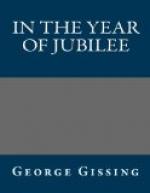His laughter rang across the street; Barmby, who kept looking back, surprised and indignant that this acquaintance of Miss. Lord’s was not presented to him, paused for a moment, but Nancy waved to him commandingly, ‘Straight on!’
They reached Charing Cross. Horace, who took no part in the conversation, and had dropped behind, at this point found an opportunity of stealing away. It was Crewe who first remarked his absence.
‘Hollo! where’s your brother?’
’Gone, evidently.—Hush! Don’t say anything. Will you do something for me, Mr. Crewe?’
‘Of course I will. What is it?’
Nancy pursued in a low voice.
’He’s gone to meet Fanny French. At least, he told me so; but I want to know whether it is really Fanny, or some one else. He said they were to meet in front of the Haymarket Theatre. Will you go as quickly as you can, and see if Fanny is there?’
Crewe laughed.
‘Like a bird!—But how am I to meet you again?’
’We’ll be at the top of Regent Street at nine o’clock,—by Peter Robinson’s. Don’t lose time.’
He struck off in the westerly direction, and Barmby, looking round at that moment, saw him go. Engrossed in thought of Nancy, Samuel did not yet perceive that her brother had vanished.
‘Your friend isn’t coming any further?’ he said, in a tone of forbearance.
‘No.’
‘But where’s Mr. Lord?’ exclaimed Jessica.
Nancy pretended to look back for him, and for a minute or two they waited. Barmby, glad to be delivered from both male companions, made light of the matter; Horace could take care of himself; they had the appointment for a quarter to eleven;—on! And he now fixed himself resolutely at Nancy’s side.
She, delighted with the success of her stratagem, and careless of what might result from it, behaved more companionably. To Luckworth Crewe’s society she had no objection; indeed, she rather liked him; but his presence would have hindered the escape for which she was preparing. Poor Jessica might feel it something of a hardship to pass hours alone with ‘the Prophet,’ but that could not be helped. Nancy would be free to-night, if never again. They turned into the Strand, and Barmby voiced his opinion of the public decorations.
’There’s very little of what can be called Art,—very little indeed. I’m afraid we haven’t made much progress in Art.—Now what would Ruskin say to this kind of thing? The popular taste wants educating. My idea is that we ought to get a few leading men Burne Jones and—and William Morris—and people of that kind, you know, Miss. Lord,—to give lectures in a big hall on the elements of Art. A great deal might be done in that way, don’t you think so, Miss. Morgan?’
‘I have no faith in anything popular,’ Jessica replied loftily.
’No, no. But, after all, the people have got the upper hand now-a-days, and we who enjoy advantages of education, of culture, ought not to allow them to remain in darkness. It isn’t for our own interest, most decidedly it isn’t.’




